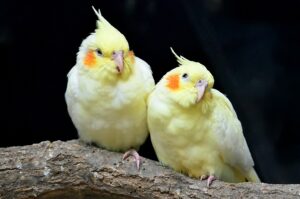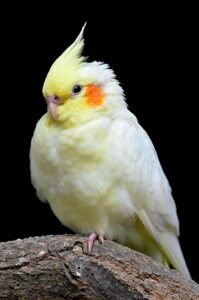What is the Average Price of a Cockatiel

Cockatiel
Cockatiel Average Price
Why Cockatiels Make Great Pets
Cockatiels are one of the most popular pet birds, and it’s easy to see why. They’re friendly, affectionate and playful–and they can even learn how to talk!
The cost of owning a cockatiel depends on several factors:
-
The age of your bird when you buy it (the older they are, the more expensive)
-
Whether it’s male or female (males tend to be more expensive)
-
Whether or not you want an intact bird (an intact male will cost more than an unaltered female)
Learn how to build your own aviary for your new Cockatiel friend: Aviary Guide
The Average Price of a Cockatiel
The average cost of a cockatiel can vary depending on a number of factors. These include the age, gender and color of your bird as well as where you purchase it from. If you are looking to adopt or buy from a reputable breeder or adoption agency, there are some things that you should look for in order to ensure that your new feathered friend is healthy and happy. Healthy birds should have clear eyes with no discharge; their beaks should be free from damage or infection; they shouldn’t appear lethargic or irritable when handled; their nails should not be overgrown (this can cause pain); their feathers should be smooth without any bald patches; they shouldn’t have any discharge coming out of their nostrils either!
Here are some average prices of a cockatiel based on age, gender, and color:
-
Baby cockatiels: $100-$150
-
Adult cockatiels: $75-$125
-
Male cockatiels: $100-$200
-
Female cockatiels: $75-$150
-
Lutino cockatiels: $150-$200
-
Albino cockatiels: $200-$250
-
Pied cockatiels: $125-$175
Please keep in mind that these prices are just rough estimates and prices may vary depending on the breeder or adoption agency. Additionally, there may be additional costs associated with purchasing a cage, toys, and other necessities for your new pet.

Cockatiel
Basic Care Requirements for Cockatiels
When you’re ready to bring your new cockatiel home, you’ll need to make sure that you have everything in place. Here are some basic care requirements for your bird:
-
Diet: Cockatiels are omnivores and can eat a wide variety of foods. They enjoy fruits and vegetables such as apples, carrots, broccoli and corn on the cob; seeds such as sunflower seeds or millet; nuts like walnuts or almonds; beans like kidney beans or black-eyed peas (cooked); cooked pasta dishes with cheese sauce; scrambled eggs with cheese melted over them (like quiche). Many owners also feed their birds formulated pellets made especially for cockatiels–you should consult with your veterinarian before changing their diet significantly!
-
Housing: Cockatiels should be housed in cages that provide enough space for them to move around comfortably without hitting their wings against anything else inside the cage at night while sleeping–this helps prevent injury! The cage should also be large enough so that there’s room left over after placing food bowls/water bottles inside too–this prevents contamination by spilled liquids leaking into bedding materials underneath where they would otherwise become damp overnight due to condensation buildup during hot weather conditions outside which could lead towards mold growth if left unchecked long enough time periods between cleaning cycles.”
Common Health Concerns for Cockatiels
Cockatiels are known to be prone to certain health issues. The best way to prevent these problems is by providing your bird with a healthy diet and plenty of exercise.
If you notice any signs of illness in your cockatiel, it’s important that you get him or her checked out by a vet immediately. If left untreated, some illnesses can be fatal for birds!
If you’re interested in owning a cockatiel, it’s important to know that there are many factors that can affect the cost of caring for your bird. The first thing to consider is whether or not you want a male or female cockatiel. While both genders make great pets, male birds tend to be more vocal than females and may require more attention from their owners.
If you decide on purchasing an adult cockatiel instead of buying one as a baby bird, then there will be no need for any additional expenses such as food or toys because its previous owner has already taken care of these things before selling it off. However, if this isn’t possible due to budget constraints then it would be best if someone else could help out with those costs by taking over ownership duties while still being able to provide enough money each month so nothing gets missed out on during those first few weeks together (like paying bills).
Free Reports
- Cockatiel Sounds: What Type of Sounds Do Cockatiels Make?
- Cane Corso Lab Mix: What You Need To Know Before Adopting Your New Cane Corso Lab Mix
- Belgian Malinois Grooming: How to Properly Care For Your Belgian Malinois
- Hamster Vomiting: What You Need To Do When Your Hamster is Vomiting
- Manchester Terrier Price: What You Should Before Adopting Your Manchester Terrier
- Boerboel Life Span: How Long Do Boerboel Dogs Usually Live?
- Canaan Dog Price: Everything You Should Know About Canaan Dogs Before Adopting
- Do Cane Corso Shed: How Much Cane Corsos Shed and How to Prevent Shedding
- Cane Corso German Shepherd Mix: Everything They Don’t Tell You About This Unique Mix
- Cane Corso Doberman Mix: Check Before You Buy! What They Don’t Tell You About Cane Corso Doberman Mixes
- Brindle Cane Corso: What You Need to Know Before Adopting
- Cockatiel Eye Problems: What to Do When Your Cockatiel Has an Eye Infection
- Top 25 Sun Conure Names: How to Name a Sun Conure, Care Tips and Tricks
- Friesian Horse Price: Everything You Need to Know Before You Buy a Friesian Horse
- Friesian Colors: The Uniqueness of Every Friesian Horse Color, Price and Care Tips